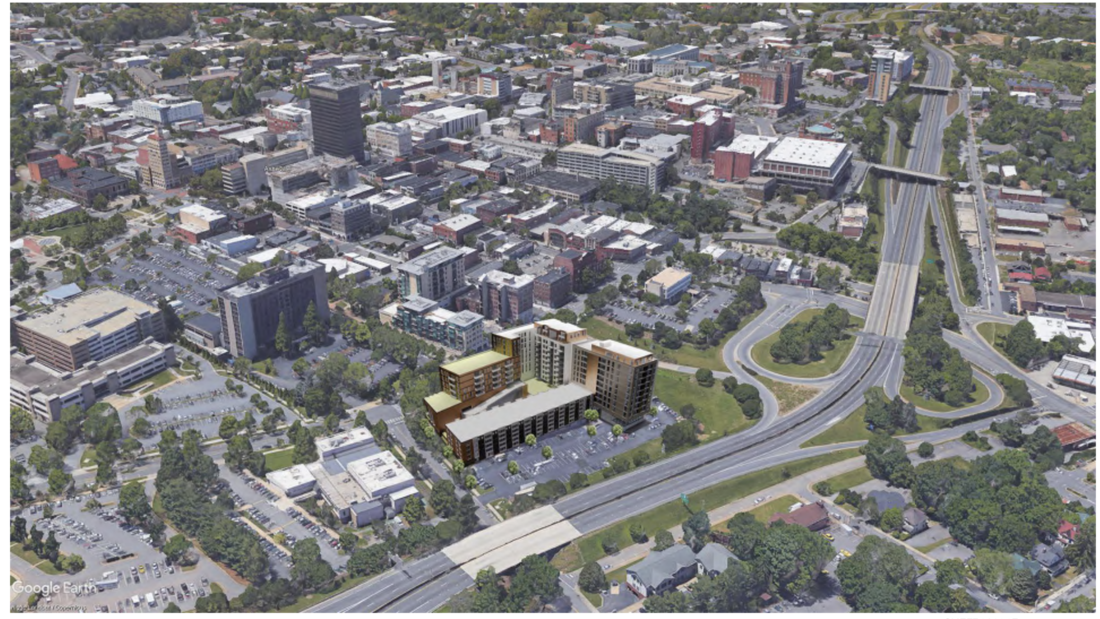Imagine stacking the Grove Arcade on top of the Harrah’s Cherokee Center – Asheville. The resulting structure still wouldn’t be as big as a new mixed-use hotel project coming to the north end of downtown Asheville.
In a 4-3 vote on Aug. 24, Asheville City Council approved conditional zoning that allows the existing Four Points by Sheraton hotel to more than quintuple its current size with a mix of uses, including apartments, condominiums, extended stay hotel rooms, parking and ground-level commercial space. Vice Mayor Sheneika Smith and Council members Kim Roney and Antanette Mosley opposed the development.
The current hotel at 22 Woodfin St., located on 3.5 acres on the north side of Asheville’s central business district, stands at around 87,000 square feet and comprises 150 hotel rooms. According to a staff report, expansion will boost that square footage to 477,000, adding eight hotel rooms and 49 extended stay rooms. The project also includes 106 residential units, a mix of rental apartments and for-sale condos. Ten of those apartments will be deed restricted at 80% of area median income ($60,100 per year for a family of four) for 20 years, bringing the cost of a two-bedroom unit to about $1,132 per month.
Approximately 8,000 square feet of commercial space will be available on the ground floor, which may include a 3,000-square-foot grocery store. The project will also include 302 off-street parking spaces, 174 in a multilevel parking structure for residents and visitors.
Asheville ended a 17-month hotel moratorium in February after Council approved regulations that established a hotel overlay district, design constraints and an incentive-based program that allows hotel developers to clear projects without Council review if they contribute to equity-related public benefits.
City Attorney Brad Banham told Xpress after the meeting that while the new Four Points construction is located in the hotel overlay district, its size required the project to go before Council for conditional zoning under the city’s Unified Development Ordinance.
Council member Sage Turner noted that some members of Council had requested that the developer and property owner, Kansas-based Hulsing Enterprises, apply the new hotel ordinance rules to the project anyway. Derek Allen, the developer’s attorney, said that the city’s standards had been used in the design of the project. Hulsing also offered to donate $196,000 to the city’s affordable housing trust fund or reparations fund if the project was approved.
Before the vote, Roney asked whether jobs at the hotel would pay enough for workers to afford to live at the location at the deed-restricted costs.
“I’m looking at the priorities and goals of our Living Asheville Comprehensive Plan and thinking about our overlapping emergencies and how we can reduce the harm that’s done to the people and the planet as we get from where we are to where we aspire to be,” Roney said. “So I’m curious: How many jobs in this development, when completed, will be likely to be at or above what would be 80% AMI, which is $20.34 an hour?”
Allen said his team had not completed an analysis to determine wages at the project.
Three people spoke during public comment and opposed the hotel over concerns about gentrification and the number of accommodations downtown.
“In a town that nearly has more Airbnbs and hotel rooms than housing, where Airbnbs take up more housing here than any other city in the United States, adding more hotels is a gentrifying mess that further pushes people out, people at the intersection of BIPOC [Black, Indigenous and people of color] and poor and unhoused and working class and queer and trans,” said resident Abbie Young. “Every hotel added in this city takes away from housing in this community.”
The zoning request passed without comment from other members of Council.
ARPA funding vote heads to Council Sept. 14
Before the meeting, Council members completed a second work session aimed at narrowing a list of priorities for spending roughly $26.2 million in federal funding from the American Rescue Plan Act, a COVID-19 relief package passed by Congress in March. City staff determined eight categories for the spending: affordable housing, homelessness services, small business recovery, workforce development, food systems, city infrastructure, domestic violence prevention and assistance and increased governmental communication.
During the meeting itself, members of the public were invited to participate in the process for the first time. Eight people spoke on the agenda item, with several noting the prior lack of opportunity to provide input.
“There has been zero effort towards public engagement or a process that would allow residents to directly shape the priorities of these funds. Council has chosen to allow the public to comment just once, after the categories have already been decided by Council and staff,” said Patrick Conant, the director of local governmental transparency project Sunshine Request. “The information provided in two work sessions and on tonight’s agenda is so vague that it’s really difficult to see what projects will actually come out of this process.”
Council will vote on whether to approve the funding categories on Tuesday, Sept. 14. A request for proposals will open in October, with Council voting to approve final project awards in December.




Given the substitutability of hotels and short term rentals, increasing hotel supply will, at the margin, reduce attractivenrss of people converting housing to short term rentals.
More fundamentally, Roney is a weak thinker. 40 million people will be added in the US in the next 30 years. Some of them will live and visit here. We can have more sprawl, which Roney’s vote essentially represents, or a denser structure that is greener and more conducive to public transportation.